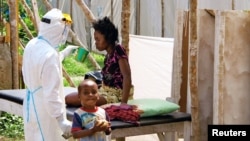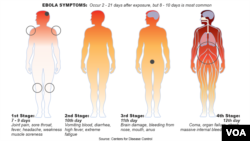Sierra Leone has passed a law that makes it illegal to harbor people with Ebola.
Under the new law, anyone found hiding an Ebola patient could face up to two years in jail.
Sierra Leone's parliament passed the law late Friday.
The World Heath Organization says people may hide their stricken relatives rather than face the stigma and social rejection associated with the virus. It says others may view Ebola care wards as places where patients get sicker and die.
Meanwhile, on Saturday, Britain's Department of Health said a British citizen living in Sierra Leone has tested positive for Ebola. Few other details were immediately available.
Ivory Coast closes borders
Late Friday, Ivory Coast announced it is closing its land borders with Guinea and Liberia, joining a group of other African nations shielding themselves against the four nations -- Guinea, Liberia, Sierra Leone, and Nigeria -- with Ebola outbreaks.
On Friday, officials in Nigeria said the Ebola virus in the country had for the first time spread to people who did not have direct contact with the country's first victim.
The development came as the World Health Organization announced the death toll from the epidemic in West Africa has risen to 1,427 people. The WHO said Friday there are 2,615 confirmed cases of Ebola in Guinea, Liberia, Sierra Leone and Nigeria.
How disease is transmitted
Ebola is transmitted through direct contact with blood or bodily fluids of an infected person.
The disease causes fever, vomiting, diarrhea and uncontrollable bleeding through bodily openings, including the eyes, ears and nose. Previous outbreaks have had a death rate of up to 90 percent, although the death rate in the current epidemic is closer to 50 percent.
Two American aid workers who were infected with Ebola in Liberia left the U.S. hospital this week where they had been receiving treatment.
Doctors say Kent Brantly and Nancy Writebol have recovered. They received the experimental drug ZMapp but doctors said they do not know if the medication helped them recover.







